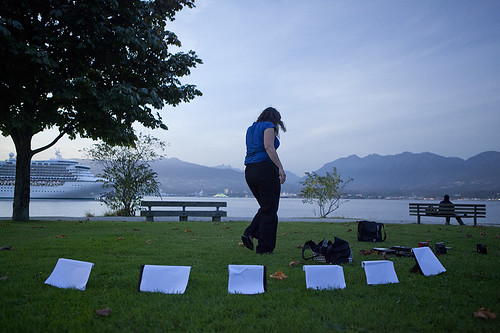
A crowd of us gather in a secluded part of Crab Park next to a weathered looking torii and a ginkgo tree. In the dying light of the day, we have come to witness Robin Brass perform. Out of a shopping bag, she takes out some simple sound equipment: some mini amps, shoebox recorders, a discman, and a handheld tape recorder. The voice of a man floats through the air, his voice older, distorted, hard to hear in this open space. Other materials reveal themselves. Seven picture frames, covered with pieces of white paper, are placed in a semi-circle facing the audience. There is a big stack of papers, bound together. A bag is dumped out with reels and reels of cassettes and magnetic tape.
A voice loops, the syllable "Wo-wo wo" adding a meditative rhythm to the piece. Holding on to the end of the tape, Brass tosses the plastic canisters to the wind, pulling in lengths of tape in large, swooping movements. These beautiful gestures cause masses of tape to gather in a cloud around her arms and flutter in the breeze. Tape is yanked out of its cassette casing. It all gathers in a big pile at the centre of the space Brass has created. She tosses the canisters as far as they will go, reeling them in.
The audience moves in closer to peer at what is in the picture frames, as Brass uncovers them. All are photographs in black and white. One shows a figure walking along a railroad with a dog. Another shows a group of painted tipi tents. Mostly we see group portraits of First Nations people from a time gone by. Where they were found is not disclosed.
As more tape is unraveled, a helicopter passes loud and low over our heads. Brass' movements grow more frantic, more exhausted. Orange light shines through the mist over the ocean. Finally I am able to pick up some of the audio, snippets of "Sit down, fall asleep" and perhaps "all the songs in the songbook." Brass plugs in an amp and we hear a rhythmic clacking sound like a train.
All sounds disappear except the syllables "Wo-wo" which, come to think of it, also sound a bit like a train. As a final action, Brass holds each picture towards the audience, then towards the sea and the fading sun. After placing each picture back in its place, but facing inward and away from us, she sits on the big stack of paper and lets herself fall into the mass of tape, once for each photograph. As the sound stops, we realize that it is getting dark and lights have come on in the city. It's chilly.
I am left with the impression of an archive that is revealed and destroyed. Old forms, magnetic tape, black and white photographs, paper files, are unraveled, turned away, or used as a means of collapse. Likewise the Indigenous cultural history held in these media are hidden, fragmented, elusive. Brass has given to us a poetic revival and farewell to old forms and old traditions.
- stacey ho

1 comment:
It won't truly have effect, I suppose so.
Post a Comment